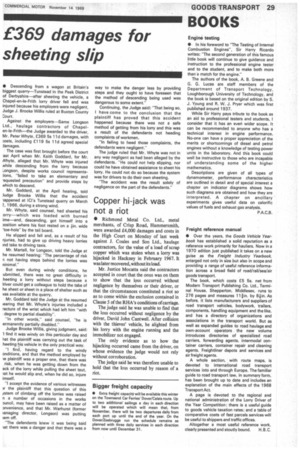£369 damages for sheeting slip
Page 31

If you've noticed an error in this article please click here to report it so we can fix it.
• Descending from a wagon at Britain's biggest quarry—Tunstead in the Peak District of Derbyshire—after sheeting the vehicle, a Chapel-en-le-Frith lorry driver fell and was injured because his employers were negligent, Judge J. Brooke Willis ruled at Buxton County Court.
Against the employers—Same Longson Ltd., haulage contractors of Chapelen-le-Frith—the Judge awarded to the driver, Mr. Peter Whyte, £369 5s 11d damages, with 7.:osts, including £119 5s 11d agreed special damages.
The case was first brought before the court ast April when Mr. Keith Goddard, for Mr. Nhyte, alleged that Mr. Whyte was injured Nhile descending from the lorry because _ongson, despite works council representa:ions, -failed to take an elementary and :equested precaution" and provide steps by rvhich to descend.
Mr. Goddard, at the April hearing, told Judge Brooke Willis that the accident iappened at ICI's Tunstead quarry on March 1966, during a strong wind.
Mr. Whyte, said counsel, had sheeted his orry--which was loaded with burned ime—and, descending, got himself into a )osition where his foot rested on a wide 'toe-hole" by the tail board.
He slipped and fell and, as a result of his njuries, had to give up driving heavy lorries Ind take to driving taxis.
Mr. Martell, for Longson, told the Judge at he resumed hearing: "The percentage of risk n not having steps behind the lorries was ninimal."
But even during windy conditions, he ubmitted, there was no great difficulty in heeting a lorry without steps because a !river could get a colleague to hold the tabs of he sheet or sheet in a place of shelter such as vas available at the quarry.
Mr. Goddard told the Judge at the resumed leering that Mr. Whyte's injuries included a racture of the wrist which had left him "with degree to partial disability".
-In other words," said counsel, "he is ermanently partially disabled."
Judge Brooke Willis, giving judgment, said: I find it was windy on this particular day and nat the plaintiff was carrying out the task of heeting his vehicle in the only practical way. "I find, having regard to the windy anditions, and that the method employed by le plaintiff was a proper one, that there was risk, when he was getting down from the ack of the lorry while pulling the sheet taut, tat he would slip and, when he did so, injure imseif.
"I accept the evidence of various witnesses )r: the plaintiff that this question of this /stem of climbing off the lorries was raised n a number of occasions in the works auncil, may have been raised as a matter of pnvenience, and that Mr. Warhurst (former ianaging director, Longson) was putting tem off.
-The defendants knew it was being Said tat there was a danger and that there was a
way to make the danger less by providing steps and they ought to have foreseen that the method of descending being used was dangerous to some extent."
Continuing, the Judge said: "That being so, I have come to the conclusion that the plaintiff has proved 'that this accident happened because there was not a safe method of getting from his lorry and this was a result of the defendants not heeding complaints of workmen.
"In failing to heed those complaints, the defendants were negligent."
The judge ruled that Mr. Whyte was not in any way negligent as had been alleged by the defendants. "He could not help slipping, nor could he have obtained assistance to sheet his lorry. He could not do so because the system was for drivers to do their own sheeting.
"The accident was the result solely of negligence on the part of the defendants."




















































































































